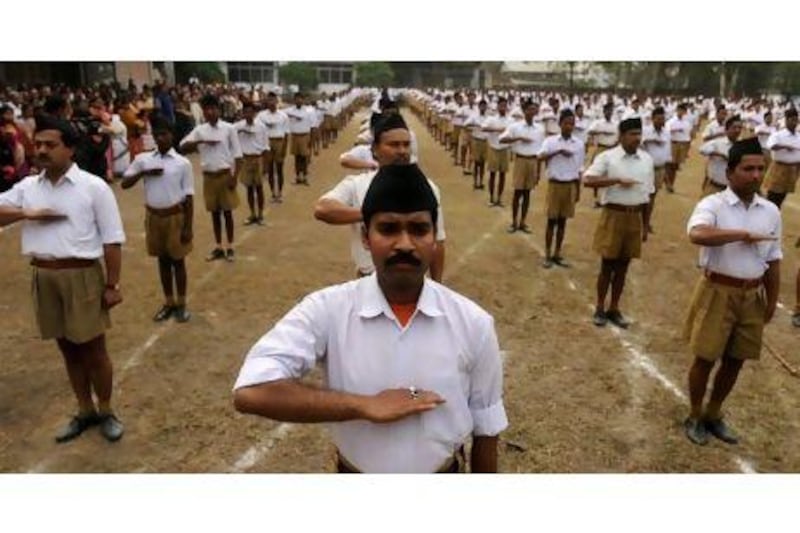NEW DELHI // For an organisation that has always been quick to raise the spectre of Islamist terrorism in India, the Rashtriya Swayamsevak Sangh, or RSS, the country's leading Hindu-rights body and the ideological fountainhead of the main opposition party, the Bharatiya Janata Party, finds itself suddenly grappling with a case of turned tables.
A spate of arrests of its members, in connection with bomb blasts across the country, has given birth to the phrases "saffron terror" and "Hindu terror".
This negative publicity has alarmed the RSS enough to start what it calls an abhiyan, a mass-contact drive in which volunteers go door-to-door, distributing pamphlets, trying to convince their public that the RSS is not connected with terrorist activity, and thus attempting to undo the damage to its image.
The RSS's abhiyan, begun discreetly in early January, will continue until the end of February in various parts of the country.
Nearly 40 RSS swayamsevaks, as the volunteer-members call themselves, have been questioned or investigated by security agencies, over various acts of terror: the 2007 bombings inside the Mecca Masjid in Hyderabad, which killed nine people; the blasts in 2007 on the Samjhauta Express train heading to Pakistan, which killed 68 people; the 2007 explosions in the tomb of a Sufi saint in Ajmer, Rajasthan, which killed three people; and the bombings in 2008 in the town of Malegaon, in Maharashtra, which killed seven.
Seven RSS members or associates are said to be among the prime accused in these cases. One of these seven, Sunil Joshi, was shot and killed soon after the Ajmer blast by, his family claims, his "own men".
Radical Hindu bodies such as the RSS and its sister outfit the Vishwa Hindu Parishad (VHP) have been accused of organised violence before. Rank-and-file RSS and VHP members were charged with involvement in the demolition of the Babri Masjid mosque in 1992 in Ayodhya, the subsequent communal riots in Mumbai, andthe communal riots in Gujarat in 2002.
The recent arrests, however, mark the first time that so many leading RSS members have been interrogated or arrested in connection with the planning of acts of terror.
Perhaps the most vital piece of evidence that has made it into the public domain is the 42-page signed confession of Swami Aseemanand, a member of the RSS since the mid-1970s. Mr Aseemanand was arrested last November in the temple town of Haridwar; a copy of his confession was recently procured by the news weekly Tehelka.
Written in Hindi, the statement quotes Mr Aseemanand as first saying, "I told everyone we should answer bombs with bombs," and later, "I suggested that 80 per cent of the people of Malegaon were Muslims and we should explode the first bomb in Malegaon itself. I also said that during the Partition, the Nizam of Hyderabad had wanted to go with Pakistan so Hyderabad was also a fair target."
The RSS has been struggling to respond to these investigations and to Mr Aseemanand's confession. Early in January, at a rally in Maharashtra, Ram Madhav, one of the RSS' top leaders, was quoted in The Organiser, the RSS's in-house publication, as stating: "Half of the accused in cases of so-called Hindu terrorism have been falsely incriminated. The government is deceiving the people and trying to portray pious people as terrorists."
More recently, however, Mr Madhav tempered his assertion by admitting to the press that a few individuals may have "strayed".
The charges of terrorism levied upon the RSS have given the ruling Congress party,- otherwise beleaguered by a spate of corruption cases, a supply of political ammunition against the RSS and the BJP.
Last year, a diplomatic cable from the American ambassador to India, Timothy Roemer, revealed the Congress Party's opinion on radical Hindu outfits such as the RSS. The cable, released by Wikileaks, indirectly quoted Rahul Gandhi, the scion of the Congress's Gandhi dynasty.
"Responding to the Ambassador's query about [the Pakistan-based militant outfit] Lashkar-i-Taiba's activities in the region and immediate threat to India, Gandhi said there was evidence of some support for the group among certain elements in India's indigenous Muslim community," the cable read. "However, Gandhi warned, the bigger threat may be the growth of radicalised Hindu groups, which create religious tensions and political confrontations with the Muslim community.
"The risk of a 'home-grown' extremist front, reacting to terror attacks coming from Pakistan or from Islamist groups in India," the cable continued to quote Mr Gandhi, "was a growing concern and one that demanded constant attention."





